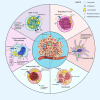Crosstalk between the tumor immune microenvironment and metabolic reprogramming in pancreatic cancer: new frontiers in immunotherapy
- PMID: 40356913
- PMCID: PMC12066759
- DOI: 10.3389/fimmu.2025.1564603
Crosstalk between the tumor immune microenvironment and metabolic reprogramming in pancreatic cancer: new frontiers in immunotherapy
Erratum in
-
Correction: Crosstalk between the tumor immune microenvironment and metabolic reprogramming in pancreatic cancer: new frontiers in immunotherapy.Front Immunol. 2025 Jul 25;16:1643932. doi: 10.3389/fimmu.2025.1643932. eCollection 2025. Front Immunol. 2025. PMID: 40787459 Free PMC article.
Abstract
In recent years, the incidence and mortality of pancreatic cancer (PC) are increasing year by year. The highly heterogeneous nature of PC, its strong immune escape ability and easy metastasis make it the most lethal malignant tumor in the world. With the rapid development of sequencing technology, the complex components in the tumor microenvironment (TME) of PC have been gradually revealed. Interactions between pancreatic stellate cells, tumor-associated fibroblasts, various types of immune cells, and cancer cells collectively promote metabolic reprogramming of all types of cells. This metabolic reprogramming further enhances the immune escape mechanism of tumor cells and ultimately induces tumor cells to become severely resistant to chemotherapy and immunotherapy. On the one hand, PC cells achieve re and rational utilization of glucose, amino acids and lipids through metabolic reprogramming, which in turn accomplishes biosynthesis and energy metabolism requirements. Under such conditions, tumorigenesis, proliferation and metastasis are ultimately promoted. On the other hand, various types of immune cells in the tumor immune microenvironment (TIME) also undergo metabolic reprogramming, which leads to tumor progression and suppression of anti-immune responses by inhibiting the function of normal anti-tumor immune cells and enhancing the function of immunosuppressive cells. The aim of this review is to explore the interaction between the immune microenvironment and metabolic reprogramming in PC. The focus is to summarize the specific mechanisms of action of metabolic reprogramming of PC cells and metabolic reprogramming of immune cells. In addition, this review will summarize the mechanisms of immunotherapy resistance in PC cells. In the future, targeting specific mechanisms of metabolic reprogramming will provide a solid theoretical basis for the development of combination therapies for PC.
Keywords: PC; immunotherapy; mechanisms; metabolic reprogramming; time.
Copyright © 2025 Shi, Cui, Wang, Liu, Meng and Zhang.
Conflict of interest statement
The authors declare that the research was conducted in the absence of any commercial or financial relationships that could be construed as a potential conflict of interest.
Figures


Similar articles
-
Interplay between tumor mutation burden and the tumor microenvironment predicts the prognosis of pan-cancer anti-PD-1/PD-L1 therapy.Front Immunol. 2025 Jul 24;16:1557461. doi: 10.3389/fimmu.2025.1557461. eCollection 2025. Front Immunol. 2025. PMID: 40777041 Free PMC article.
-
Inhibition of FAK promotes pancreatic cancer immunotherapy by mediating CXCL10 secretion to enhance CD8+ T cell infiltration.Oncoimmunology. 2025 Dec;14(1):2539442. doi: 10.1080/2162402X.2025.2539442. Epub 2025 Jul 28. Oncoimmunology. 2025. PMID: 40726089 Free PMC article.
-
Integrative single-cell and spatial transcriptomics uncover ELK4-mediated mechanisms in NDUFAB1+ tumor cells driving gastric cancer progression, metabolic reprogramming, and immune evasion.Front Immunol. 2025 Jul 4;16:1591123. doi: 10.3389/fimmu.2025.1591123. eCollection 2025. Front Immunol. 2025. PMID: 40688093 Free PMC article.
-
Lipid metabolic reprogramming in colorectal cancer: mechanisms and therapeutic strategies.Front Immunol. 2025 Jul 11;16:1603032. doi: 10.3389/fimmu.2025.1603032. eCollection 2025. Front Immunol. 2025. PMID: 40718481 Free PMC article. Review.
-
Research progress on the interaction between glucose metabolic reprogramming and lactylation in tumors.Front Immunol. 2025 Jul 14;16:1595162. doi: 10.3389/fimmu.2025.1595162. eCollection 2025. Front Immunol. 2025. PMID: 40755753 Free PMC article. Review.
References
Publication types
MeSH terms
LinkOut - more resources
Full Text Sources
Medical

